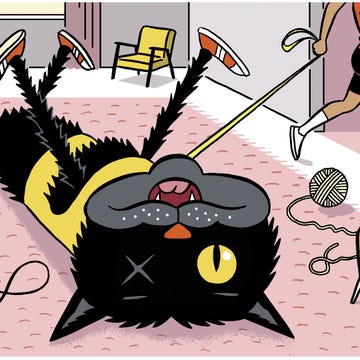I was practically sprinting up the Central Park roadway, over on the East Side, north of the Metropolitan Museum of Art. I was running along with Dorothy, a lawyer/mother/biochem Ph.D. of about my age whom I had met the night before at a gala reception, and with whom, fueled by one too many martinis, I had cheerfully agreed to meet early the next morning for a run. (That last martini, the one that triggers terrible ideas, is known colloquially as the Beverage of Foolishness.)
“Dorothy,” I said to her, “we’ve known each other only a short while, but I have to admit I find you extremely impressive. You’re sophisticated, learned, professionally accomplished in a variety of fields, and obviously a dedicated and successful runner.”
She glanced over at me with a slight look of alarm. I imagine that she was mentally checking to make sure she had mentioned her husband. She had. I went on.
“And I’m going to go out on a limb here and suggest that you’re rather impressed with me as well,” I said. “Given my fame, my professional success, my charm and wit, and of course my own celebrated career as a runner.”
I allowed a pause, partially for dramatic effect, partially because I desperately needed a gulp of oxygen in order to finish my point.
“So since I’m very impressed with you already, and, as I said, I’m sure you’re already impressed with me, do you think we can slow down?”
“Oh, thank you!” she said. “I was dying here, trying to keep up with you!”
“The same,” I said, and we slowed down, to mutual satisfaction, and enjoyed the rest of our run around the park.
I have run many times with people I’ve just met—one of the great pleasures of our sport is the opportunity to do it alongside all kinds of people, everywhere in the world—and while there is almost always a difference in ability and state of training, it’s always been simple to negotiate. You say how fast you want to go—eight-minute miles, or 12, or six—and if the difference isn’t too great, the faster runner slows down for the other. Or we smile and agree to meet back at the park entrance, and he leaves me in a cloud of dust. Easy.
This was different. I couldn’t remember a time, outside of a race, when I was pushing so hard to look like a better runner than I was. And Dorothy told me she was doing the same, and it was just as unusual for her. So what gives? I decided to turn to science.
In recent years social scientists and psychologists have substantiated a persistent phenomenon, which one author calls “risk-taking as a situationally sensitive male mating strategy,” or what laymen might call “guys acting stupid to impress girls.” In one experiment, scientists told a group of young male skateboarders that they wanted to record them doing their best tricks to see how performing them affected their testosterone levels. But some of the skaters were watched by male “scientists,” and some by attractive female “scientists.” (By the way, there are established ways of objectively measuring how attractive you are. Let us all hope never to find out our score.)
Not only did being watched by attractive women raise the testosterone levels of the skateboarders more than being watched by men, but the skateboarders also crashed more when women were watching. They were attempting riskier and riskier behavior—the difference between a skater saying to himself, in midair, “This isn’t going to work, I’d better bail,” and “BANZAI!!!!” was entirely due to who was watching. And then, after the test, the skateboarders asked the female observers for their phone numbers. Because boys.
Another study used gambling games to establish that men engage in “future discounting” when in the presence of available females. That is, they stop thinking about the future costs of an activity, and instead pursue immediate, if uncertain, gain. So when watched by an (objectively, scientifically) attractive woman, who they have been told is single, men were more likely to make riskier bets in a game of blackjack. Or, perhaps, run a lot harder in the first two miles of an eight-mile run than if they were on their own.
Interestingly—and devastating to my hypothesis that Dorothy and I were acting out a strange, unconscious mating display—in these same experiments, women demonstrate none of this behavior. Many of the simulations were done using both male and female test subjects, and the women made the same decisions no matter who was watching. Whatever strange drive evolution has grafted onto men, forcing us to act recklessly to impress members of the opposite sex, women were spared, because either risky behavior isn’t a successful mating strategy for them, or they don’t need to perform dominance displays to defeat other suitors.
Could You Teach Your Cat to Run.
One more problem for my notion: I knew Dorothy was happily married, and I’m not single either. The experiments on subconscious behavior suggest that if a man isn’t looking for romance and knows the woman in question isn’t either, he won’t display the same risky, future-discounting behavior.
So I’m still not sure exactly what happened, but I can offer some speculation, and it has to do with a detail I left out. It’s true that Dorothy and I had met at a gala, but it wasn’t a random encounter. It had been a formal affair with thousands of attendees at a luxury hotel, raising money for a nonprofit, and I was there to entertain the crowd. And Dorothy didn’t merely attend the gala: She organized it. She is the head of the nonprofit that hired me.
So: I am usually desperate to please anyone, but this woman was, for the moment, my boss. I wanted to let her know that not only had I been the right choice to amuse and entertain her colleagues and esteemed guests, but I was also a stalwart and reliable fellow—one who will, in fact, show up at 8 in the morning after one too many martinis—as well as a badass runner. Because, as noted above, boys.
As for Dorothy, I don’t need to have my attractiveness scientifically scored to know with certainty that any kind of mating ritual was as far from her mind as the Great Rift Valley of Africa, where our ancestors had evolved, and where, I suppose, some primitive man really wanted to impress a primitive woman, so he invented fire, and then probably set his hair on it. But I didn’t flatter her just to get her to slow down. She is an extremely accomplished person, with a Ph.D. and a law degree and a demanding, prestigious job and a leadership position at an important nonprofit, not to mention raising a happy family in her spare time. So we speculate that Dorothy got to where she is, in part, by being smarter, working harder, and being more disciplined than everyone around her. Who would have been, during her formative years, given her age, mostly men. And thus, her attitude, when confronted with yet another idiot guy who seemed to want to challenge her, might have been, out of long habit: “Bring it, brother.”
I got back in touch with Dorothy to test this thesis, and she confirmed it, sort of. “I am an alpha,” she said. “I compete with everyone. I can’t help it.” My being a male may have had little to do with it. I’m trying to work out if that’s a comfort to me or not.
So it may have been no more than two amateur jocks of a certain age trying to show each other, and ourselves, that we still had it. It’s a ritual that happens in weight rooms and basketball courts and soccer fields all over the world, and results in countless strained muscles and torn ACLs and guys—and, with a nod to Dorothy, gals—cursing themselves for being stupid. All I know is if I ever get a chance to run with Dorothy again—and I hope I do; she’s a fine runner and excellent company—I’m going to remind her that I already know both those things, before we start.
* * *
Peter Sagal is a 3:09 marathoner and the host of NPR’s Wait, Wait…Don’t Tell Me! For more, click here.













